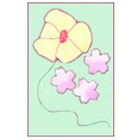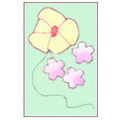My full legal name is Victoria Emily Mariko Kraus. Growing up, I responded to Bikki, the Japanese pronunciation of Vicki, my English nickname. My mother, friends and relatives in Japan, and Japanese family friends in the U.S. all called me Bikki’chan. (The “chan” being the Japanese version of the Spanish informal, affectionate and kiddish suffix, “ito” or “ita”, as in the names Juanito and Juanita.)
Before starting Japanese school, I was accustomed to the two versions of my nickname, Vicki and Bikki, and until starting Japanese school, I naively thought Bikki was my Japanese name. (I was seven years old.) When someone asked, I would say Bikki was my Japanese name. My mother was the first to call me Bikki simply because she could not pronounce the letter “v.”
On the first day of my first year at Japanese school, my teacher asked me what my Japanese name was. I told her it was Bikki’chan. I even wrote it in Japanese for her. With a facial expression between impressed curiosity and strange surprise, my teacher looked at me in such a way for a long enough moment that I could feel what she was thinking. She wanted to know why I knew how to write in Japanese (katakana) and why I thought my name was Japanese. At the time, the thought of me not looking Asian correlating with my teacher’s apparent puzzlement didn’t cross my mind. I hadn’t learned about or experienced “race relations” and being “hapa” wasn’t mainstream or “cool” yet.
I didn’t tell my teacher that I did in fact have a Japanese middle name. Because I never used it, I forgot to mention it. The following week, my teacher gave each student in the class yellow tuition envelopes to give to our parents. The name on my envelope was Mariko Kraus. (I figured someone in the office called my parents to ask them what my Japanese name was.) I didn’t identify with Mariko. Looking at it, saying it, introducing myself as “Mariko” to my classmates in Japanese school, did not in the least attribute to how I identified as a person of Japanese descent. During class, it was mainly the teacher who called our names. At recess, however, when my classmates would call me Mariko, my response would be delayed or they would call my name at least three times before tapping me on the shoulder to get my attention. In the eight years I was there, I never did fully adjust to being called Mariko once a week for four hours by people I didn’t know. I did, however, leave Japanese school being able to distinguish my “Japanese” names (Bikki and Mariko) and understanding the difference between Japanese and Japanese American.
There is no “v”-sounding consonant or letter in the Japanese alphabet, so naturally, there are no Japanese words that begin with or contain the ‘v’ sound or letter. Consequently, when translating foreign words into Japanese, written or verbal, the “v” is replaced with a “b.” For example, the word vivacious spelled and pronounced in Japanese would be “bai-bay-cious.” The name Vanessa would be “Ba-nessa.” And Vicki, indubitably, would be “Bikki.”
When I played “House” with friends (the pretend game where a group of children take on character roles of a family, i.e. mother, father, son, daughter, grandparent, aunt or uncle), we’d give each other pretend names. I always had fun using a name other than my own like Roxie, Savannah and Tabitha. There were times when I thought about changing my first and middle names when I felt like I didn’t relate to my given names. I figured, though, that changing my name wouldn’t do anything but change what was printed on my birth certificate. People would still call me Vicki and Bikki and I would still naturally respond. However much I liked the name Tabitha, I knew I would never respond to it unless I was playing “House.”
When I finished my eighth year of Japanese school, my Mariko days were over. I don’t miss it. And I don’t know what name I would choose if I were to play “House” with my friends next week. Maybe Loxie or Sabannah.
© 2007 Victoria Kraus




